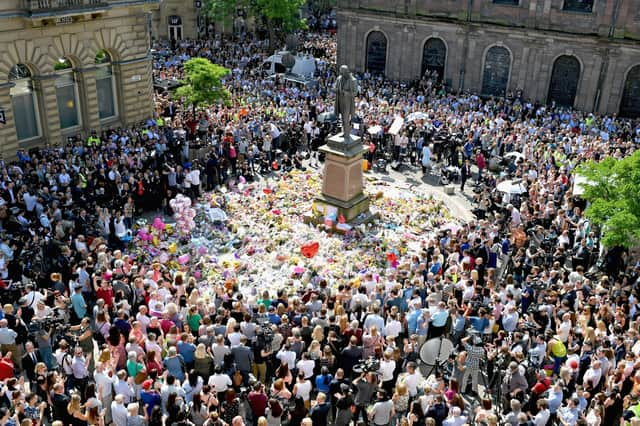Manchester Arena bombing inquiry: Terrorist attack on Ariana Grande concert was an act of wickedness that inexperienced stewards missed chances to stop – Tom Wood


The first conclusions of the inquiry into the 2017 Manchester Arena bombing provide an example of penetrating forensic examination and a list of missed opportunities. British Transport Police and the stewarding company come in for particular criticism.
The suicide attack by Salman Abedi on the largely teenage audience attending the Ariana Grande concert was an act of pure wickedness. There were no VIP targets and no political dimension to the event. It was a slaughter of innocents, exactly as intended. The composition of the device, a shrapnel bomb of nuts and bolts, says it all.
Advertisement
Hide AdAdvertisement
Hide AdThe fact the event was seen as low risk dictated the planning and much of what unfolded later.
Most of the missed opportunities identified by inquiry chair, Sir John Saunders, can fairly be described as resulting from complacency and lack of professional confidence. A lax attitude by police officers and a lack of training and experience among the stewards saw missed chances to intercept the bomber.
On a number of occasions, young stewards were alerted to his suspicious behaviour. One was reluctant to approach Abedi for fear of being thought racist. Another made a half-hearted attempt to report suspicions to the event’s control room but gave up after one unsuccessful attempt.
In a damning passage from his report, Sir John Saunders concludes that “vigilant or competent staff could have saved lives”.
These conclusions raise wider issues. In times of emergency, what can we really expect from young part-time stewards? With basic training and a yellow jacket, they may provide a visible presence, but in a crisis, little more.
The truth is that in circumstances like the Manchester bombing, stewards did not have the training or experience to give them the confidence to challenge the bomber.
The role of private security companies has grown in recent years. Not so long ago, police sent hundreds of officers to sporting or other large events. It was untenable and over time some very good security companies filled the gap.
Well-led and organised, their stewards took pressure off the police and public purse. However, most stewards were young casual labour, well-intended and managed but individually raw and inexperienced.
In recent years, many of the local security companies have been bought over by large national firms, but the essentials are the same.
The Manchester bombing brutally exposed that weak link.
Advertisement
Hide AdAdvertisement
Hide AdWe can be sure that there will much more to come from the inquiry but, in the end, there will be no cheap or easy fixes.
A review of our system of threat assessment seems certain. Counter-terrorism training for all security workers has already been recommended. Perhaps we will see a better mix of police and security staff in future.
But we must also consider how we supervise people we know threaten us. Abedi was on our radar. We knew he was a threat just as we knew that the Fishmongers Hall killer Usman Khan was dangerous. By putting hope over experience, we allowed them freedom to kill.
We can only hope this latest inquiry into mass terrorist murder gives guidance on this most important issue. We must act, to protect our human right to life, and to do justice to the dead and maimed of the Manchester Arena.
Tom Wood is a writer and former Deputy Chief Constable
